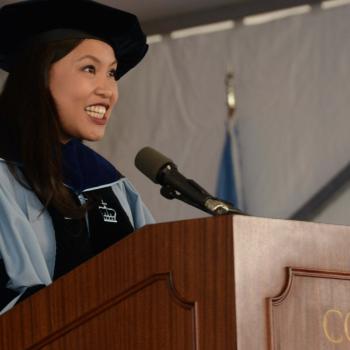As a new semester begins, it is a good time to reflect on the practices that students – particularly graduate students – need to survive and even thrive. Graduate programs are designed to make you part of a guild of professional experts, and require an enormous amount of reading and writing in order to prepare you for those professional credentials. The rigors of a graduate program are tough – their relationships and mental and physical health often suffer. Many students never really adjust to the proper mentality of a graduate student – they’re still in the cycles of procrastination and all-nighters that they adopted as undergrads. This will not cut it any more.
Though I took some bumps and bruises, I did manage to survive graduate school. Partly this was because I had a wonderful doctoral advisor who cared about his students as people. Partly it was because I was part of a supportive cohort of students. I also had helpful, understanding parents, and Notre Dame offered financial support on which I could reasonably live and eat. Prospective students will want to gauge such factors when they’re making decisions about where to go – or even IF to go, given the dismal state of the job market.
There are three key practices that will help graduate students survive their programs and end up as healthy as possible on the other end. First is learning to read like a graduate student. I once estimated that during coursework at Notre Dame, I needed to be reading about seven books a week. A book a week for each of my classes, plus books I needed to read for research papers or other responsibilities, added up to about seven a week. “Reading” in this context cannot mean reading each book word-for-word.
You need to think about why you are reading the book, for what class and for what professor, and tailor your speed of reading accordingly. You need to grasp the thesis of the book, its methods and its significance. Book reviews are indispensable aids for this kind of reading. I recommend that you read two or three book reviews before reading the book itself, to get a feel for others’ reactions and assessments of the book’s argument and significance. You should highlight and take notes with thesis, methods, and significance in mind, and not get bogged down in the details.
The second practice is making sleep and exercise part of your work routine. Again, many graduate students take the “I’ll sleep when I am dead” approach, especially in the last month of the semester. But this invariably damages the quality of the reading and writing you’re doing. Sleep and exercise (if nothing else, daily walks of 20-30 minutes) are essential components for productivity and mental acumen. Sometimes the best thing you can do for that research paper is to stop writing and go to sleep.
Of course, making room for sleep means diligence early in the semester, so that you are not pulling all-nighters. It also means working in the morning when you’re not in class. My best days of dissertation writing began at about 6 am. Often fueled by nothing but coffee, I would read and write until about lunchtime. If you do that everyday (or at least your non-teaching days), you’ll definitely have time to sleep.
The final practice you need to cultivate is faithful church attendance (and here I am obviously thinking of Christian students). It is so easy to think of this as optional when deadlines are looming, but you need consistent church involvement more than ever as a graduate student. Good fellowship and edifying worship and teaching will give you much needed perspective on your challenges as a student, and offer sources of prayer support, which you will definitely need during these years. If you are new to the area, go immediately to a church that’s part of your denominational tradition, or ask around to see where other Christian students attend. You may want to visit a few churches, but try your best to be done with church shopping by about a month into the program. Settle down, get connected, and invest in the life of the church. Not only is this obligatory for Christians, it is life-giving.
What other areas might you identify as must-do practices for graduate students, or anyone involved in the academic life?
Friends, you can sign up here for my Thomas S. Kidd author newsletter. Each newsletter will update you on what’s happening in the world of American, a religious and political history, and current events. It will contain unique material available only to subscribers, and each will help you keep up with my blog posts, books, and other writings from around the web. [Your e-mail information will never be shared.] Thanks!
















